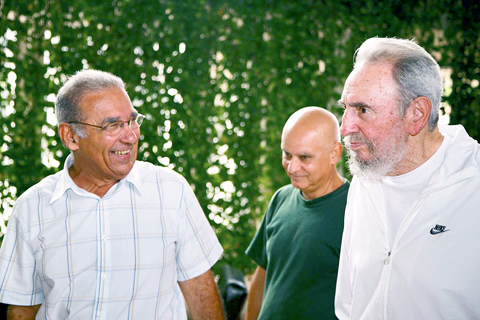Cuban revolutionary leader Fidel Castro made his first known public appearance since falling ill four years ago in a visit this week to a Havana scientific facility, a blog and a Cuban government Web site reported on Saturday.
Photographs posted on a state-run Web site taken by his son Alex showed a smiling, healthy-looking Castro, 83, talking with directors of the National Center for Scientific Research.

PHOTO: REUTERS
News of the visit first came out on a pro-government blog, where photographs taken with a cellphone were posted of Castro greeting admirers as he left the center.
The blog can be found on the Internet at: (http://bloguerosrevolucion.ning.com/profiles/blogs/苯idel-visito-el-centro).
The blogger, Rosa Baez, wrote that Castro was spotted making a ?urprise visit?to the center on Wednesday and stopped to greet and ?hrow kisses?to the group that waited for a chance to see him.
?e is thin, but looked good and, according to our director, is very good mentally,?said Baez, whose blog appears on a Web site entitled ?loggers and Correspondents of the Revolution.?br />
In the photos, the white-bearded Castro wore an athletic jacket, as he has in virtually all photographs published since he went into seclusion.
Castro has been seen only in occasional photographs and videos since he underwent emergency intestinal surgery in July 2006 and ceded power provisionally to his younger brother, Cuban President Raul Castro.
His first public appearance in years came as Cuba was preparing to release 52 political prisoners, all jailed in a crackdown on the opposition in 2003 while Castro was still in power.
The visit to the scientific center celebrated the 45th anniversary of the center? creation in July 1965, the story on www.cubadebate.cu said.
Last year, Venezuelan President and close ally Hugo Chavez said Fidel Castro had been going for walks near his Havana residence, but they were never confirmed by the government and there were no known photos of him out and about.
Fidel Castro, after leading the 1959 revolution that toppled a US-backed dictator, ruled Cuba for 49 years and, with his many long, televised speeches and numerous public appearances, dominated Cuban life.
He resigned the presidency in February 2008 and Raul Castro, 79, officially took over as president in a vote by the National Assembly.
Even though Fidel Castro has stayed out of sight, he has maintained a public presence through opinion columns written for Cuba? state-run media, and still plays a role behind the scenes.
For more than a year, his columns have dwelt almost exclusively with international topics. He has said he was told his columns on domestic issues were interfering with the government? work.
In the past few weeks, Fidel Castro has predicted in his columns that the world is on the verge of nuclear war, to be sparked by conflict between the US and Iran over international sanctions against Iran? nuclear activities.

In the sweltering streets of Jakarta, buskers carry towering, hollow puppets and pass around a bucket for donations. Now, they fear becoming outlaws. City authorities said they would crack down on use of the sacred ondel-ondel puppets, which can stand as tall as a truck, and they are drafting legislation to remove what they view as a street nuisance. Performances featuring the puppets — originally used by Jakarta’s Betawi people to ward off evil spirits — would be allowed only at set events. The ban could leave many ondel-ondel buskers in Jakarta jobless. “I am confused and anxious. I fear getting raided or even

POLITICAL PATRIARCHS: Recent clashes between Thailand and Cambodia are driven by an escalating feud between rival political families, analysts say The dispute over Thailand and Cambodia’s contested border, which dates back more than a century to disagreements over colonial-era maps, has broken into conflict before. However, the most recent clashes, which erupted on Thursday, have been fueled by another factor: a bitter feud between two powerful political patriarchs. Cambodian Senate President and former prime minister Hun Sen, 72, and former Thai prime minister Thaksin Shinawatra, 76, were once such close friends that they reportedly called one another brothers. Hun Sen has, over the years, supported Thaksin’s family during their long-running power struggle with Thailand’s military. Thaksin and his sister Yingluck stayed

Kemal Ozdemir looked up at the bare peaks of Mount Cilo in Turkey’s Kurdish majority southeast. “There were glaciers 10 years ago,” he recalled under a cloudless sky. A mountain guide for 15 years, Ozdemir then turned toward the torrent carrying dozens of blocks of ice below a slope covered with grass and rocks — a sign of glacier loss being exacerbated by global warming. “You can see that there are quite a few pieces of glacier in the water right now ... the reason why the waterfalls flow lushly actually shows us how fast the ice is melting,” he said.

Residents across Japan’s Pacific coast yesterday rushed to higher ground as tsunami warnings following a massive earthquake off Russia’s far east resurfaced painful memories and lessons from the devastating 2011 earthquake and nuclear disaster. Television banners flashed “TSUNAMI! EVACUATE!” and similar warnings as most broadcasters cut regular programming to issue warnings and evacuation orders, as tsunami waves approached Japan’s shores. “Do not be glued to the screen. Evacuate now,” a news presenter at public broadcaster NHK shouted. The warnings resurfaced memories of the March 11, 2011, earthquake, when more than 15,000 people died after a magnitude 9 tremor triggered a massive tsunami that